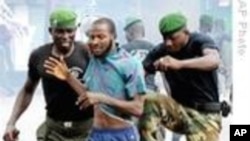<!-- IMAGE -->A tense calm reigns in the West African nation of Guinea following a brutal attack by security forces on pro-democracy demonstrators.
However, this calm masks a rising resentment against the nation’s continued military rule, which fueled the protest rally that was quashed by the violence. The United States calls on Guinea’s leaders to quickly address the situation by releasing jailed opposition figures and allowing a return to civilian rule.
The violence erupted when members of the elite presidential guard fired on a crowd of thousands gathered in a stadium in the capital, Conakry, to protest against Captain Moussa Dadis Camara, the leader of the military junta that took power in December, and his candidacy in presidential elections set for January 31.
Accounts vary on what set off the melee, but a consensus suggests security forces tried to disrupt the rally by firing tear gas into the crowd and when panic ensued they began indiscriminately firing at unarmed civilians. Rally leaders were arrested and there are reports that many women were detained and sexually assaulted. The United States, African Union, Economic Community of West African States and other members of the international community immediately condemned the attack, a topic of great concern in the United Nations Security Council the following day.
Captain Camara has tried to distance himself from the attack, downplaying the number of people killed and saying he was not there and did not command the soldiers. He also has promised an inquiry into the incident, but one that will also focus on what he called "opposition troublemakers."
If conducted fairly, such an investigation should be swift. Call it a crackdown, riot, rampage or massacre, the violence in the September 28 stadium was a brazen and inappropriate use of force against peaceful civilians who were peacefully exercising their rights to free speech and assembly.
The United States has called for an end to the violence, for the junta to bring those responsible to justice, release all political prisoners, and allow a return to democratic government. Nothing less will truly set things right.
However, this calm masks a rising resentment against the nation’s continued military rule, which fueled the protest rally that was quashed by the violence. The United States calls on Guinea’s leaders to quickly address the situation by releasing jailed opposition figures and allowing a return to civilian rule.
The violence erupted when members of the elite presidential guard fired on a crowd of thousands gathered in a stadium in the capital, Conakry, to protest against Captain Moussa Dadis Camara, the leader of the military junta that took power in December, and his candidacy in presidential elections set for January 31.
Accounts vary on what set off the melee, but a consensus suggests security forces tried to disrupt the rally by firing tear gas into the crowd and when panic ensued they began indiscriminately firing at unarmed civilians. Rally leaders were arrested and there are reports that many women were detained and sexually assaulted. The United States, African Union, Economic Community of West African States and other members of the international community immediately condemned the attack, a topic of great concern in the United Nations Security Council the following day.
Captain Camara has tried to distance himself from the attack, downplaying the number of people killed and saying he was not there and did not command the soldiers. He also has promised an inquiry into the incident, but one that will also focus on what he called "opposition troublemakers."
If conducted fairly, such an investigation should be swift. Call it a crackdown, riot, rampage or massacre, the violence in the September 28 stadium was a brazen and inappropriate use of force against peaceful civilians who were peacefully exercising their rights to free speech and assembly.
The United States has called for an end to the violence, for the junta to bring those responsible to justice, release all political prisoners, and allow a return to democratic government. Nothing less will truly set things right.




